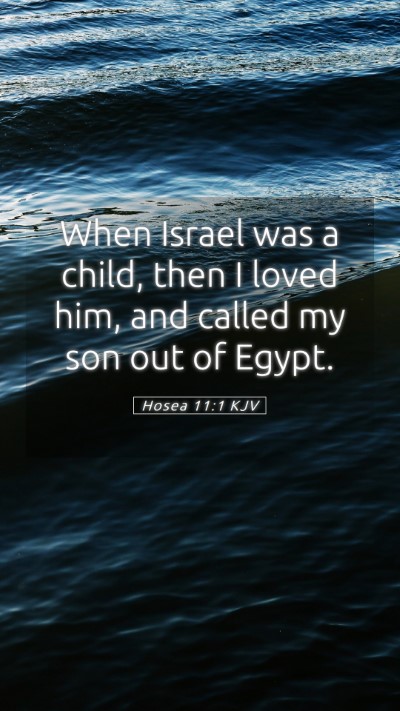Old Testament
Genesis Exodus Leviticus Numbers Deuteronomy Joshua Judges Ruth 1 Samuel 2 Samuel 1 Kings 2 Kings 1 Chronicles 2 Chronicles Ezra Nehemiah Esther Job Psalms Proverbs Ecclesiastes Song of Solomon Isaiah Jeremiah Lamentations Ezekiel Daniel Hosea Joel Amos Obadiah Jonah Micah Nahum Habakkuk Zephaniah Haggai Zechariah MalachiHosea 11:1 Meaning
What is the meaning of Hosea 11:1?
When Israel was a child, then I loved him, and called my son out of Egypt.
Hosea 11:1 Bible Verse Meaning
Understanding Hosea 11:1
Hosea 11:1 states: "When Israel was a child, then I loved him, and called my son out of Egypt." This verse is significant, encapsulating God's relationship with His people and foreshadowing the coming of Christ. Below is a comprehensive analysis combining insights from prominent public domain commentaries, including those by Matthew Henry, Albert Barnes, and Adam Clarke.
Bible Verse Meaning
The meaning of Hosea 11:1 encapsulates a deep emotional connection between God and Israel. Through this passage, God expresses the tenderness of a father toward His son, highlighting His love and care. The phrase "called my son out of Egypt" not only refers to the historical exodus but also serves a prophetic purpose in the New Testament as it relates to Jesus Christ.
Commentary Insights
- Matthew Henry: Henry emphasizes the affection of God, likening Israel’s formative years to that of a beloved child. He explains that God's call to Israel out of Egypt was an act of deliverance, mirroring how He nurtures His people throughout their struggles.
- Albert Barnes: Barnes highlights that this verse reflects both a historical and theological perspective. He notes that the reference to Egypt signifies the place of bondage and affliction from which God delivered Israel, paralleling the future deliverance through Christ from sin.
- Adam Clarke: Clarke draws attention to the prophetic nature of this verse, connecting it to Jesus’ flight to Egypt and subsequent return. He suggests that this illustrates God’s ongoing relationship with humanity, characterized by love and redemption.
Detailed Analysis
This verse provides a rich soil for Bible verse interpretations and exposure to the depths of Scripture. It serves as a bridge between the Old and New Testaments, emphasizing themes of love, deliverance, and prophetic fulfillment.
God’s love, as depicted in Hosea 11:1, is unconditional and patient. It speaks to the idea that just as a parent desires the best for their child, so does God yearn for His people. The prophecy quoted in Matthew 2:15 underscores its relevance in understanding Jesus' early life and mission.
Historical Context
When examining the historical context of Bible verses, it's important to consider the tumultuous relationship between Israel and God. The period of Hosea was marked by Israel’s disobedience and idolatry. God's declaration of love is thus a powerful reminder of His compassion despite the unfaithfulness of His people.
Interpretative Themes
- The Nature of God’s Love: God's affection for His people is persistent and enduring, showcasing the dual capacity of divine justice and mercy.
- Deliverance: The exodus from Egypt symbolizes spiritual liberation, not just physical rescue. This theme is recurrent throughout Scripture, applicable to believers' lives today.
- Prophetic Fulfillment: The connection of this verse to Jesus enriches understanding and underscores the redemptive plan woven throughout the Bible.
Application of the Verse
In applying Bible verses to daily life, Hosea 11:1 encourages believers to reflect on their identity as children of God. It prompts a recognition of God’s guiding hand through trials, just as He did with Israel. This understanding fosters gratitude and strengthens faith in God’s promises.
Cross References
To deepen your Bible study insights, consider these relevant cross-references:
- Exodus 4:22-23 – God referring to Israel as His firstborn son.
- Matthew 2:15 – The fulfillment of prophecy regarding Jesus’ return from Egypt.
- Isaiah 63:16 – Reminding the community of God's fatherly role over Israel.
Conclusion
In summary, Hosea 11:1 serves as a profound declaration of God’s enduring love for His people. Through careful Bible study guides and reflections on passages like this, individuals can glean rich insights into the nature of God and His relationship with humanity. Whether in Bible study groups or personal meditation, this verse invites exploration and understanding of God's unfailing faithfulness.


